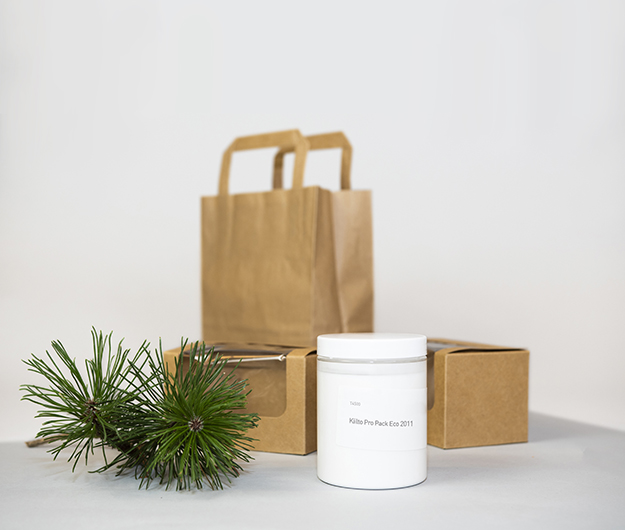More news
- Focus on the global coatings market: Global coatings market outlook
- Innovative coatings mitigate effects of deepening climate change
- View from the UK: Navigating chemical policy and sustainability
- Focus on adhesives: Unveiling unbreakable bonds – Testing redefines physical strengt...
- Focus on adhesives: Henkel and Covestro collaborate for sustainability of engineered wood ...

Finnish chemical company Kiilto aims to be net zero by as early as 2028. So, it showed a great deal of interest when Wacker experts introduced Kiilto to binders that, mathematically, had 100% of the fossil raw materials replaced by certified renewable raw materials like biomass during production.
Kiilto was established more than 100 years ago and is managed by the fourth generation Solja family. When such a family-owned company steeped in history makes a “promise to the environment” – as Kiilto did in 2018 – it’s a matter of honour to its almost 1,000 employees to fulfill this. “We want to be a leader in environmental protection in our sector, which is reflected in all our activities – from raw materials selection to packaging, energy, logistics and services,” explains Kiilto’s Maija Kulla-Pelonen, who is an R&D and Innovation Manager. “That’s why we choose renewable resources whenever possible and are continuously reducing the use of fossil raw materials,” she adds.
Kiilto has four areas of business, one of which produces and markets industrial adhesives. Vinnapas® brand vinyl acetateethylene (VAE) polymers have proven their worth in many of these adhesives. Wacker’s polymer binders ensure that the adhesive layers provide good bonding between the surfaces to be joined. This especially applies to surfaces made of paper – both uncoated and coated – cardboard and plastic film.
Wacker uses ethylene and acetic acid to first make vinyl acetate monomer, which is then copolymerised – once more in combination with ethylene – to obtain VAE. Up until a few years ago, these polymers were exclusively produced from fossil raw materials. Wacker then presented VAE-based polymer binders that, in accordance with a certified mass balance approach, are mathematically based entirely on renewable raw materials. Since then, an alternative to conventionally produced VAE polymers – one that saves on fossil resources – has been available to customers like Kiilto. Wacker has since had the challenging task of explaining to interested parties what certification in accordance with the mass balance approach actually means, in particular, dispelling any potential reservations about this just being a marketing ploy intended to give conventionally made industrial products a greener look.
Certified raw materials
Currently, bio-based acetic acid is used in the production of the VAE polymers that Wacker now markets under its Vinnapas® eco brand. The bio-based acetic acid used is certified in line with international PEFC (Programme for the Endorsement of Forest Certification Schemes) standards and is a byproduct of the woodworking industry, for example from pulp production. The wood itself stems from woodland that is sustainably managed. Since the market does not yet offer a renewable version of ethylene – the second basic raw material required for VAE – in the required quantities and under cost-effective conditions, Wacker mathematically accounts for this fossil component by increasing its use of bio-based acetic acid. The petrochemical raw-material source is, thus, effectively compensated for. This follows the specifications of the REDcert2 standard, which certifies the material use of biomass or other renewable feedstock in the chemical industry. An inspector accredited by the TÜV Nord technical inspectorate audits and certifies that everything is correct and that Wacker adheres to REDcert Ç specifications.
Wacker processes bio-based acetic acid in its existing plants together with acetic acid of fossil origin. This yields VAE polymers whose atoms stem partly from renewable and partly from fossil raw materials. Wacker then uses the mass balance approach to mathematically separate the manufactured quantity of VAE polymers into two parts. In the laboratory, the end product that stems from bio-based acetic acid is indistinguishable from the polymer based on fossil raw materials – the quality is absolutely identical. Only the raw materials used in the supply chain are different.

Accurately reflected
“We select the fraction which we designate as Vinnapas eco so that it does not exceed the amount of renewable raw material originally used,” says Lena Kläger, sustainability manager at Wacker Polymers. Kiilto was won over by this certified mass balance approach. “We believe that this process is an important first step toward fully bio-based production,” says Kulla-Pelonen, R&D Manager at the Finnish chemical company. “In many cases, the mass balance approach is a more sustainable alternative right now than operating stand-alone bio-based production, because existing production lines can be used rather than having to build new facilities that are currently less efficient.” So Kiilto decided to launch a portfolio of adhesives based on Vinnapas eco. Called Kiilto Pro Pack Eco, it comprises 16 different products for the paper and packaging industries.
Tomi Takala, director of this business field at Kiilto, says: “Our customers have the same environmental objectives as we do – promoting a circular economy, lowering our carbon footprint and supporting biodiversity. We can now offer them adhesives based on renewable raw materials that provide as much high value as our established products.”
Vinnapas eco can indeed replace Vinnapas binders based on petrochemical feedstocks one to one in formulations – quality and properties are completely identical.
Committed to sustainability
According to Takala, the decision to launch the Kiilto Pro Pack Eco portfolio was guided by the company’s promise to the environment. He added that ecological rather than economic considerations had therefore been the deciding factor. “We are nevertheless confident that the course we have taken is also sustainable from a business point of view,” he emphasises.
Johan Bülow, Polymers Sales Manager for Scandinavian and Baltic countries, welcomes the sustainability initiatives of his Finnish customer: “Together with Kiilto, we succeeded in expanding our Vinnapas eco business for adhesives applications last year, despite a very challenging economic climate marked by a difficult logistics situation and raw-material scarcity due to the pandemic.”
Bülow and his team hope to intensify collaboration with Kiilto in the future, especially on the marketing front. “We are thinking of joint workshops for industry in order to bring home the advantages of mass-balance products,” he says. After all, any customer who chooses Vinnapas eco or a product based on it already helps not only to increase the proportion of renewable resources, but also to reduce the amount of fossil raw materials in Wacker’s production lines.
Main picture caption: Packaging bonded in a way that conserves resources – companies such as Kiilto, a Finnish formulator of adhesives, rely on Wacker’s mass balanced polymer binder Vinnapas eco.



